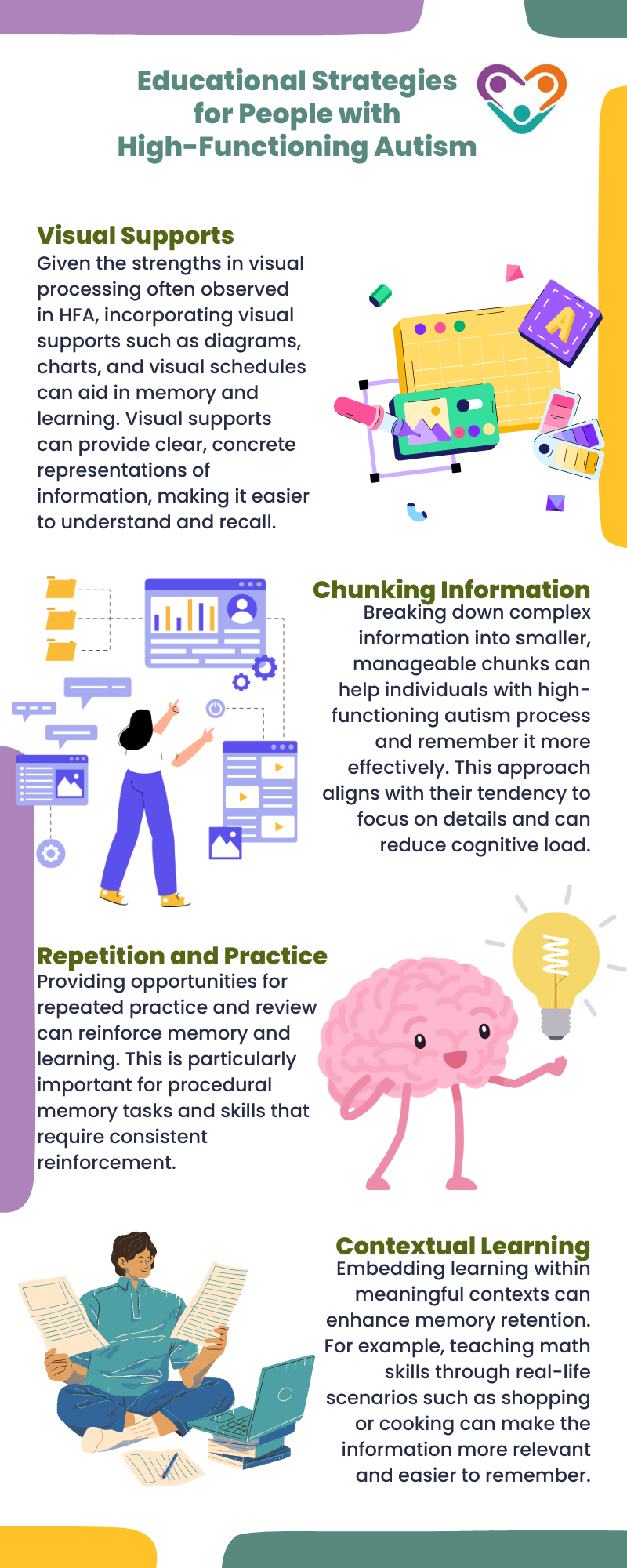High-functioning autism is a term used to describe individuals on the autism spectrum who have average or above-average intelligence. Despite their cognitive capabilities, people with high-functioning autism often face unique challenges, particularly in social interactions and communication. One area that has garnered significant interest in recent years is the relationship between high-functioning autism and memory.
In this article, we’re going to explore the intricacies of memory in individuals with high-functioning autism, drawing on relevant studies to provide a comprehensive understanding.

What is High-Functioning Autism?
High-functioning autism is not an official medical diagnosis but is commonly used to describe individuals on the autism spectrum who do not have intellectual disabilities. People with high-functioning autism typically have a higher level of functioning in terms of language and cognitive skills compared to others on the spectrum.
However, they still exhibit core characteristics of autism, including difficulties with social communication and repetitive behaviors.
Memory is a complex cognitive function encompassing various types, including short-term memory, long-term memory, working memory, and procedural memory. Research has shown that individuals with autism spectrum disorder (ASD), including those with high-functioning autism, often exhibit distinct memory profiles. Understanding these differences is crucial for developing effective educational and therapeutic strategies.
Short-Term Memory
Short-term memory is the capacity to hold a small amount of information in an active, readily accessible state for a brief period. Research on short-term memory in individuals with high-functioning autism has yielded mixed results.
Some studies suggest that short-term memory is relatively intact in high-functioning autism, while others indicate potential deficits. A study by Williams, Goldstein, and Minshew (2006) found that individuals with high-functioning autism performed similarly to neurotypical individuals on tasks requiring the recall of sequences of numbers or words.
However, when the tasks involved more complex or less structured information, individuals with high-functioning autism showed reduced performance. This suggests that while basic short-term memory might be preserved, the ability to manage more complex information may be compromised.

Long-Term Memory
On the other hand, long-term memory is responsible for storing information over extended periods, ranging from hours to a lifetime. It encompasses various subtypes, including declarative memory (facts and events) and procedural memory (skills and tasks).
Declarative Memory
Within declarative memory, episodic memory (personal experiences) and semantic memory (general knowledge) are two crucial components.
Research indicates that individuals with high-functioning autism often show strengths in semantic memory but may experience challenges with episodic memory. A study by Crane and Goddard (2008) revealed that adults with high-functioning autism had difficulties recalling specific personal events, although their ability to remember factual information was comparable to that of neurotypical individuals.
Procedural Memory
Procedural memory, which involves the learning of motor skills and routines, appears to be relatively intact in individuals with high-functioning autism. Studies have shown that people with high-functioning autism can acquire and retain new motor skills at rates similar to those of neurotypical individuals. This suggests that procedural memory, which relies on different brain circuits than declarative memory, may be less affected by the cognitive differences associated with high-functioning autism.
Working Memory
Working memory is the ability to hold and manipulate information over short periods, which is essential for tasks such as problem-solving, planning, and following instructions. Research indicates that working memory can be particularly challenging for individuals with high-functioning autism.
A meta-analysis by Wang, Cui, and Wang (2017) highlighted consistent deficits in working memory among individuals with high-functioning autism. These deficits were more pronounced in tasks requiring the manipulation of information rather than simple maintenance. For example, while individuals with high-functioning autism might remember a sequence of numbers, they might struggle to rearrange those numbers in a different order.
Autobiographical Memory
Autobiographical memory, a subset of episodic memory, involves the recollection of personal experiences and events. This type of memory is crucial for building a coherent sense of self and personal history. Research has shown that autobiographical memory can be impaired in individuals with high-functioning autism.
Lind conducted a study comparing autobiographical memory in adults with high-functioning autism and neurotypical controls. The results indicated that individuals with high-functioning autism recalled fewer specific details and events from their lives compared to the control group. This deficit in autobiographical memory may contribute to the difficulties with self-awareness and social interactions often observed in high-functioning autism.

Factors Influencing Memory in high-functioning autism
There are several factors that may contribute to the distinct memory profiles observed in individuals with high-functioning autism. These include the following:
Brain Structure and Function
Neuroimaging studies have revealed structural and functional differences in the brains of individuals with high-functioning autism, which may underpin their unique memory profiles. For instance, abnormalities in the hippocampus, a brain region critical for memory formation, have been observed in people with high-functioning autism.
A study by Schumann et al. (2004) found that the hippocampi of individuals with autism, including those with high-functioning autism, showed differences in volume and shape compared to neurotypical individuals. These differences could affect the ability to form and retrieve certain types of memories, particularly those involving complex or nuanced information.
Information Processing Styles
Individuals with high-functioning autism often exhibit a detail-focused processing style, sometimes referred to as “weak central coherence.” This means they tend to focus on individual details rather than the overall context or gestalt.
While this can lead to strengths in tasks requiring attention to detail, it may also contribute to difficulties in processing and integrating more complex information, which can impact memory performance.
Research by Happé and Frith (2006) suggests that this detail-focused processing style might explain some of the memory differences observed in high-functioning autism. For example, while individuals with high-functioning autism might excel in tasks involving rote memorization of facts, they might struggle with tasks requiring the integration of those facts into a coherent narrative or context.
Sensory Sensitivities
Sensory sensitivities are common in individuals with high-functioning autism and can affect how information is perceived and remembered. Over- or under-sensitivity to sensory stimuli can influence attention and memory encoding processes.
A study found that sensory sensitivities in individuals with high-functioning autism were associated with differences in memory performance. For instance, heightened sensitivity to auditory stimuli could make it difficult to focus on and encode verbal information, leading to poorer recall in tasks involving spoken instructions or dialogue.
Implications for Education and Intervention
Understanding the memory profiles of individuals with high-functioning autism has important implications for education and intervention. Tailoring strategies to leverage strengths and address challenges can enhance learning and support for individuals with high-functioning autism.
Here are the educational strategies that have been proven to work:

Meanwhile, here are therapeutic interventions that parents and caregivers should consider:
- Memory Training Programs – Memory training programs designed to improve working memory and other cognitive skills can be beneficial for individuals with high-functioning autism. These programs often involve exercises and games that challenge and enhance memory capacities.
- Cognitive Behavioral Therapy (CBT) – CBT can help individuals with high-functioning autism develop strategies to manage anxiety and sensory sensitivities, which can indirectly improve memory performance. Reducing anxiety can enhance focus and attention, facilitating better memory encoding and retrieval.
- Social Skills Training – Enhancing social skills can support better memory for social interactions and autobiographical events. Programs that teach social scripts and provide practice in real-life social situations can improve both memory and social functioning.
Memory in individuals with high-functioning autism is characterized by both strengths and challenges. While basic short-term and procedural memory may be relatively intact, deficits in working memory, episodic memory, and autobiographical memory are common.
Understanding these unique memory profiles is essential for developing effective educational and therapeutic interventions that can support the cognitive and social development of individuals with high-functioning autism. By leveraging their strengths and addressing their challenges, we can help individuals with high-functioning autism achieve their full potential and improve their quality of life.
Sources:
https://www.psychologytoday.com/us/blog/keep-it-in-mind/202004/autism-and-memory

